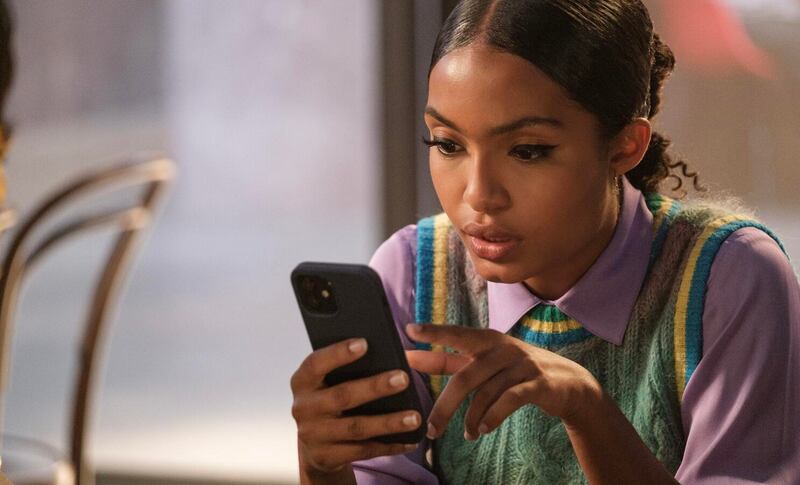A television series can be an awakening.
They showcase what is possible and reflect our life experiences back at us. But what happens when certain audiences don’t see themselves on screen?
Representation has been at the center of industry discourse for years now, with different networks and studios seemingly committed to telling stories that showcase different walks of life.Yet, there is a demographic that is disappearing from a genre that once embraced them. Where are all the messy Black girls in coming-of-age TV?
When the first poster for Prime’s new comedy Overcompensating dropped, there was immediate excitement for the series, which is created by and stars internet sensation Benito Skinner. Some noticed, however, that there seemed to be no Black women present in the otherwise diverse series. The same issue has been pointed out following the rise in popularity of FX’s sleeper-hit Adults, another recent coming-of-age series that doesn’t feature any Black women.
Young Black women make up 64% of Black college students yet somehow they’re invisible on shows about college life 🤔 https://t.co/tdPZkXPjbI
— krystal (@SquirtleMobCapt) April 7, 2025
These two series aren’t outliers. Summer hits We Were Liars and Motorheads also do not feature any prominent Black women (or Black characters at all). Black women seem to be disappearing from young adult content, a genre that they previously dominated in the 2000s and the late 2010s. Along with this, the Black characters that are featured in series like these are a husk of the vibrant, complicated women who used to thrive in coming-of-age series. Gone are the days where Black women were given space to be nuanced and, at times, straight-up messy. Now, young Black women look back to shows that aired years ago, in previous decades, to see a relatable version of themselves.
This isn’t to say that Overcompensating and Adults are bad shows, or that they lack diversity. They are both fantastic comedies that push boundaries in a television landscape that often lacks sex and nuance, and they both allow their characters to fumble (sometimes embarrassingly so) through the entrance to adult life. They also deftly explore queerness and feature a wide-spanning cast which includes South Asian, Mexican, Lebanese, and Black men. Still, their lack of Black women raises a pressing question: Why aren’t Black women given just as much space to be as complex on TV as other demographics are?
Can someone who works or knows about the film industry tell me why casting directors have strayed away from casting black women https://t.co/3uHSGwIKi6
— active era (@blkcomictwit) May 31, 2025
When young Black women are portrayed on screen nowadays, they’re forced into a box that displays an unrealistic image of perfection. These characters are depicted as having it all together; their careers and their personal lives melding seamlessly. When they don’t, they push through any struggle and always triumph, typically aiding their white counterparts and making sure they’re successful as well.
The Black women of modern television exude an unyielding strength, which is sometimes commendable, but more often than not forces them to emulate an archetype rather than exist as fully realized characters. The rare shows that do include complicated Black women, like the great Pretty Little Liars: Original Sin and Everything Now, are often canceled after one or two seasons.

Gone are the times when series like Grown-ish or We Are Who We Are thrived. While Black women are flourishing on cinema screens, television creators are alienating a significant demographic of viewers by not making space for flawed Black women. The cusp of adulthood is scary enough as it is, but existing in a world where you can’t even see yourself or your potential future on television puts Gen Z and Gen Alpha at a significant disadvantage over those of us who were blessed enough to grow up watching Girlfriends, That’s So Raven, and Insecure.
The purpose of this thread is to keep track of the number of Y/A projects that don’t have a black actress as a lead. Will be updating as we get more casting news. #Wherearetheblackgirls pic.twitter.com/2BOg3M4yTx
— kay (@jasimisinclair) August 27, 2024
These shows were some of the most exciting of their kind because they allowed their Black female protagonists to exist not as a caricature of how Black women should act, but instead as imperfect individuals who make mistakes and suffer the consequences. Now, the white experience has become the default in television geared at young adults, and Black women specifically have been shunned from these stories. By overlooking and blatantly shunning Black women, studio executives are telling one of their most diverse groups of viewers that their stories don’t matter.

The success of Overcompensating and Adults relies on how these shows allow their characters to be chaotic, and oftentimes straight-up problematic. The exclusion of Black women in these narratives remains a pressing concern.
Now more than ever, we need to see Black women who don’t always have it all together represented in television, but especially coming-of-age TV. There was a time where Black women were allowed to be messy, loud and sometimes down-right mean. As these characters slowly disappear from the small screen, television becomes less nuanced.
Instead of only spotlighting strong and composed Black women in their stories, television must make an effort to allow these women to be as flawed as their white counterparts, so that young audiences can see themselves in stories that they deserve to be a part of.
The post Where Are All the Messy Black Girls on Coming-of-Age TV? appeared first on The Daily Beast.




